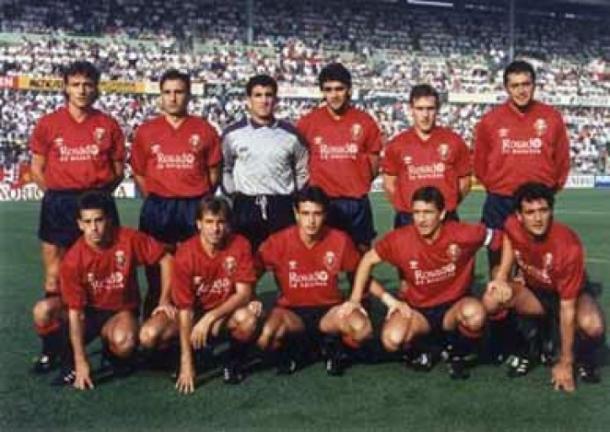Club Atlético Osasuna

|
| Early Osasuna Historycal squad. |
Osasuna — History, Culture, Identity & The Spirit of Navarra
Foundation — The Birth of Navarra’s Club (1920)
Osasuna was founded on 24 October 1920 after the merger of two earlier clubs in Pamplona. The club’s name comes from the Basque word “osasun”, meaning **health, strength, and vitality** — perfectly representing the identity and fighting spirit of Navarra’s people.
Early Competitions & Identity Formation (1920–1940)
During its first decades, Osasuna competed in the regional leagues, growing steadily through passionate local support. These years established the club’s core values: hard work, unity, defensive strength, and a deep connection to Navarra’s culture.
First La Liga Promotion — A New Era Begins (1935)
Osasuna earned its first historic promotion to La Liga in 1935. This was a massive achievement for a small club competing against Spain’s biggest teams. Although relegation followed later, the club built strong foundations for future success.
Post-War Challenges & Survival (1940–1960)
After the Spanish Civil War, Osasuna faced financial hardship, inconsistent performances, and unstable league positions. But the unwavering loyalty of Navarra’s supporters kept the club alive during difficult times. Osasuna’s culture of persistence was born from these years.
El Sadar — One of Spain’s Loudest & Most Loyal Stadiums
In 1967, Osasuna inaugurated Estadio El Sadar (originally named “Campo de Tajonar”). El Sadar is famous for its intensity, unity, and raw emotion — a fortress where even giant clubs struggle. Recently renovated, it remains one of Spain’s loudest and most intimidating stadiums.
Growing Stability & European Qualification (1980s)
The 1980s brought major improvement. Osasuna developed strong squads, rose in league standings, and even achieved qualification for the **UEFA Cup in 1985** — a historic moment for the small Navarrese club.
Golden Era — European Brilliance & Copa Finals (2000–2010)
Osasuna’s most successful modern era came in the 2000s.
Strong management, excellent recruitment,
and hard-working squads led to major achievements:
• 2005 Copa del Rey Final
• 2005–06 La Liga 4th place — Champions League qualifiers
• 2006–07 UEFA Cup semifinals
Legends of this era include:
• Patxi Puñal
• Enrique “Piti”
• Raúl García
• Carlos Cuéllar
• César Azpilicueta
This period defined Osasuna as a respected top-flight club capable of competing with Spain’s biggest teams.
Crisis, Relegation & Emotional Return (2012–2018)
Financial instability and poor results led to Osasuna’s relegation in 2014. The club even dropped to Segunda B temporarily due to crisis. But with incredible fan support and strong academy development, Osasuna rebuilt step by step and earned promotion back to La Liga in 2016 and stabilized again by 2019.
Modern Osasuna — Identity, Discipline & Copa Return
Osasuna under Jagoba Arrasate has become one of La Liga’s most disciplined, defensively solid, and well-coached teams. They reached the 2023 Copa del Rey Final, a historic achievement filled with emotion and pride for Navarra.
Osasuna Identity — Loyalty, Fight & Navarra’s Heart
Osasuna stands for:
• Teamwork
• Effort
• Discipline
• Regional pride
• Supporter ownership
The club is more than football — it is a symbol of Navarra’s culture, passion, and resilience.

The Osasuna crest features the royal crown above Navarra’s historic shield, symbolizing unity, heritage, and the fighting spirit of the region’s people.
